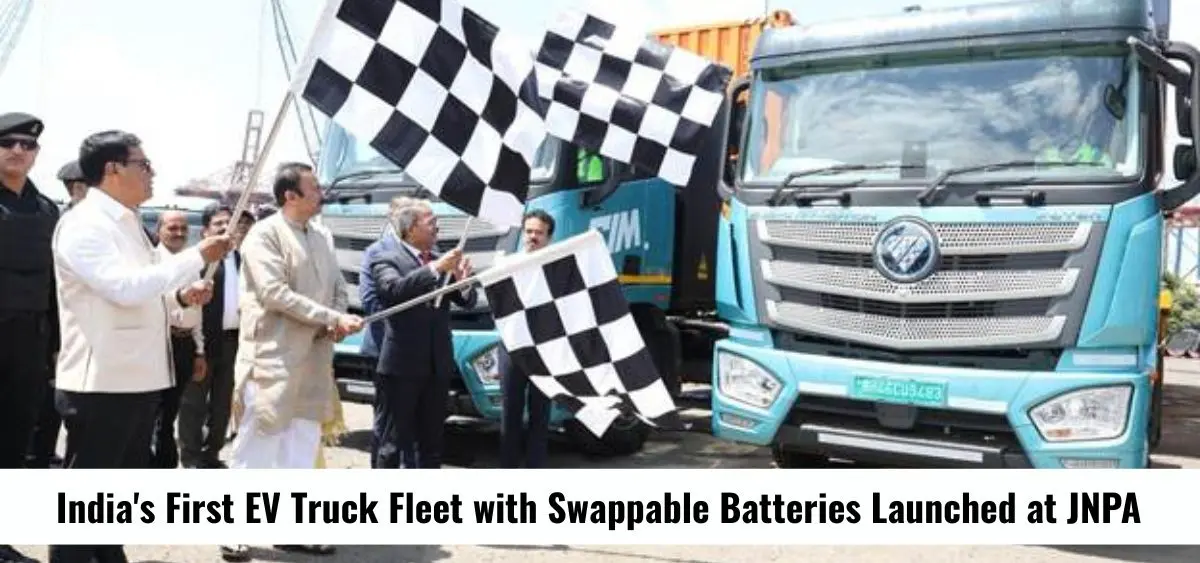The future of logistics in India just took a historic turn! India’s First EV Truck Fleet with Swappable Batteries has been flagged off by Union Minister of Ports, Shipping & Waterways, Shri Sarbananda Sonowal, at Jawaharlal Nehru Port Authority (JNPA), Mumbai. This groundbreaking initiative not only positions JNPA as the leader in sustainable port operations but also marks a paradigm shift in how India envisions green logistics. With battery-swapping technology ensuring speed and efficiency, this move is more than just a launch—it’s the beginning of a cleaner, smarter, and future-ready logistics revolution.
A Major Leap in Green Port Operations
At the event, a heavy-duty battery swapping station was also commissioned to ensure efficient fleet operations. Unlike conventional charging, battery swapping technology minimizes downtime, enabling seamless port logistics. This initiative reinforces JNPA’s ambitious target of converting 90% of its internal heavy truck fleet (around 600 vehicles) to electric by December 2026.
Currently, 50 electric trucks have been inducted, with plans to expand the fleet to 80 by the end of 2025. The trucks have been manufactured by Montra Electric, part of the Murugappa Group, further underlining the importance of industry collaboration in accelerating India’s energy transition.
National Alignment and Global Standards
The introduction of EV trucks at JNPA is more than just a port-level upgrade—it aligns directly with India’s national climate and logistics strategies, including:
- India’s Net-Zero Commitment by 2070
- National Electric Mobility Mission Plan (NEMMP)
- PM Gati Shakti & National Logistics Policy (NLP)
- Maritime India Vision 2030 – Green Ports Initiative
By electrifying its logistics operations, JNPA is also creating a replicable benchmark for other ports to follow, encouraging widespread EV adoption across India’s maritime ecosystem.
MoU for Benchmarking Framework
During the event, an MoU was signed between JNPA and the Isaac Centre for Public Policy (ICPP), Ashoka University. This agreement focuses on creating a framework for tariff benchmarking, ensuring fair pricing models for port operations across various cargo types and commodities. Such measures are expected to enhance transparency and competitiveness in India’s maritime trade.
Leaders Speak: Sustainability at the Core
Union Minister Sarbananda Sonowal emphasized that the induction of these EV trucks was not just a port initiative but a message to the world that Indian ports are ready to embrace sustainability, efficiency, and innovation. He highlighted ongoing efforts in solar and wind power adoption, LNG and hydrogen infrastructure, and digitalization projects across Indian ports.
JNPA Chairperson, Shri Unmesh Sharad Wagh, echoed this sentiment, stating that the initiative represents a paradigm shift in port logistics, where sustainability becomes the foundation of growth.
Why This Matters for India?
As India’s largest container port, handling nearly half of the country’s container trade, JNPA’s transition to EVs will deliver multiple benefits:
- Lower carbon emissions and reduced environmental impact.
- Noise and particulate pollution control in and around the port.
- Operational efficiency with quicker turnaround times via battery swapping.
- Nationwide impact as other ports replicate this model.
Conclusion
The launch of India’s first EV truck fleet with swappable batteries at JNPA is a transformative step in the nation’s journey toward green logistics. It blends innovation with responsibility, demonstrating how India’s maritime sector can drive climate action while sustaining trade growth. By setting new benchmarks in decarbonisation, efficiency, and global competitiveness, JNPA is paving the way for a cleaner, greener, and future-ready logistics ecosystem.
Related Articles:-

